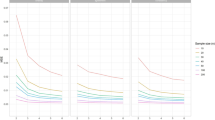Abstract
In clinical studies there are huge numbers of laboratory parameters available that are measured at several visits for several treatment groups. The status quo for presenting laboratory data in clinical trials consists in generating large numbers of tables and data listings. Such tables and listings are required for submissions to health authorities. However, reviewing laboratory data presented in the form of tables and listings is a lengthy and tedious process. Thus, to enable efficient exploration of laboratory data we developed elaborator, a comprehensive and easy-to-use interactive browser-based application. The elaborator app comprises three analyses types for addressing different questions, for example about changes in laboratory values that frequently occur, treatment-related changes and changes beyond the normal ranges. In this way, the app can be used by study teams for identifying safety signals in a clinical trial as well as for generating hypotheses that are further inspected with detailed analyses and possibly data from other sources. The elaborator app is implemented in the statistical software R. The R package elaborator can be obtained from https://cran.r-project.org/package=elaborator. Patients’ laboratory data need to be extracted from the clinical database and pre-processed locally for feeding into the app. For exploring data by means of the elaborator, the user needs some familiarity with R but no programming knowledge is required.






Similar content being viewed by others
Change history
22 July 2021
A Correction to this paper has been published: https://doi.org/10.1007/s43441-021-00326-4
Notes
As there are three possibilities for a change (i.e., increase, decrease and stability) between two adjacent visits, and 4–1 transitions from one visit to the next in the considered example, there are 27 possible time courses.
References
Kulmann H, Muysers C, Dmitrienko A, Röhmel J. The biostatistics innovation center at Bayer. Biopharm Rep. 2016;23:1–5.
Bradley L, Singh S, Simon J, Gemzell-Danielsson K, Petersdorf K, Groettrup-Wolfers E, Ren X, Zvolanek M, Seitz C. Vilaprisan in women with uterine fibroids: the randomized phase 2b ASTEROID 1 study. Fertil Steril. 2019;111:240–8.
Hahsler M, Hornik K, Buchta C. Getting things in order: an introduction to the R package seriation.J Stat Softw. 2008;25:1–34.
Hahsler M, Buchta C, Hornik K. Seriation: infrastructure for ordering objects using seriation: R package version 1.2–8. Available from https://CRAN.R-project.org/package=seriation.
R Core Team. R: A language and environment for statistical computing. R Foundation for Statistical Computing, Vienna, Austria. 2020. Available from https://www.R-project.org/
Chang W, Cheng J, Allaire J, Xie Y, McPherson J. shiny: Web application framework for R. R package version 1.5.0. Available from https://CRAN.R-project.org/package=shiny
Acknowledgements
The authors thank Nicole Mentenich for proof-reading the manuscript.
Funding
The development of elaborator and the preparation of this manuscript were sponsored by Bayer AG.
Author information
Authors and Affiliations
Contributions
All authors constituted the project team that developed the app. SJ is the main contributor of the manuscript. StJ supported the team in the implementation of the app.
Corresponding author
Ethics declarations
Conflict of interest
Silke Janitza, Madhurima Majumder,· Franco Mendolia, Steffen Jeske, Hermann Kulmann have no conflicts of interest.
Additional information
The original online version of this article was revised because, due to a Production error, it was published without author corrections.
Supplementary Information
Below is the link to the electronic supplementary material.
Rights and permissions
About this article
Cite this article
Janitza, S., Majumder, M., Mendolia, F. et al. elaborator: A Novel App for Insights into Laboratory Data of Clinical Trials. Ther Innov Regul Sci 55, 1220–1229 (2021). https://doi.org/10.1007/s43441-021-00318-4
Received:
Accepted:
Published:
Issue Date:
DOI: https://doi.org/10.1007/s43441-021-00318-4




